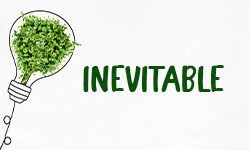
Understanding the correct meaning of terms is crucial when used in academic writing, so the correct meaning can be conveyed and communicated. Although technical definitions are very common in the scholastic field, some errors may occur due to a lack of proper understanding of the correct meaning. This article offers a clear overview of the origin of the word “inevitable,” its meaning, and how it is used correctly.
Definition of “inevitable”
Inevitable can be used as an adjective and a noun, referring to occasions, results, or conditions that are bound to happen due to the nature of circumstances, unavoidable forces, or regulations. It has its roots in the Latin language, from the word “inevitabilis” consisting of the prefix “in,” meaning “not,” and “evitabilis,” meaning “avoidable.”
Use of “inevitable” in a sentence as an adjective
When used in the English language, the word “inevitable” primarily serves as an adjective. The following examples show how to use this term in a sentence.
Use of “inevitable” in a sentence as a noun
In rare cases, the word “inevitable” can also be used as a noun, referring to something that cannot be avoided or prevented. The following examples show the correct use of the word as a noun.
How to spell “inevitable” correctly
Many errors in using the word “inevitable” are sound-based. Some possible spelling mistakes of “inevitable” are “inevitible,” “inevitabel,” “inevitale,” or “inevitble.” The English language has an array of inconsistencies between spelling and pronunciation, which often leads to phonetic confusion and, therefore, errors in spelling. However, there is only one correct way to spell “inevitable” that has its roots in the Latin language.
- “in” — Latin prefix, meaning “not”
- “evitabilis” — Latin adjective meaning “to be avoided” or “avoidable”
Correct spelling
inevitable
Wrong spelling
inevitible
inevitabel
inevitale
inevitble
Remembering how to spell “inevitable” can be made easier with a mnemonic or a memory aid. Here’s a simple one that might help:
Think of the phrase: “It’s never erroneous venturing into tales about book learning experiences.”
This phrase uses the first letter of each word to spell out “inevitable.” By associating the word with this phrase or creating a vivid mental image around it, you can recall the spelling more easily. The key is to create a connection in your mind that helps you remember the sequence of letters in “inevitable.”
Synonyms for “inevitable”
By using different synonyms of a word, such as “inevitable,” you reduce the risk of repetition and redundancy and, simultaneously, expand your vocabulary to improve your expression. Here are four synonyms of the word “inevitable” used in sentences to highlight the correct use.
| Synonyms | Examples |
| Unavoidable | Working hard is an inevitable requirement for success. |
| Working hard is an unavoidable requirement for success. | |
| Unescapable | Being a public figure, dealing with setbacks is inevitable. |
| Being a public figure, dealing with setbacks is unescapable. | |
| Necessary | In hard times, changes are inevitable. |
| In hard times, changes are necessary. | |
| Predestined | Religious people believe that their paths and duties are inevitable. |
| Religious people believe that their paths and duties are predestined. |
FAQs
If a situation is inevitable, it means that the situation cannot be avoided or prevented due to its nature of circumstances. In other words, it means that something will definitely happen.
Example
- It is inevitable to get cold in winter when you leave the house without a anorak.
In some rare cases, “inevitable” can be used as a noun, referring to the aspect of something unavoidable and unpreventable.
Example
- Death is an inevitable part of life.
“Inevitable” usually has a negative connotation but can also be used neutrally or positively. Here is an example of “inevitable” in a sentence with a positive connotation.
Example
- After working for many hours and preparing carefully, success is an inevitable result.
Some synonyms for “inevitable” are “unavoidable,” “unescapable,” “necessary,” and “predestined.”
Here are some example sentences using “inevitable” as an adjective and noun.
Examples
- Hard work is an inevitable requirement for success.
- You can’t avoid the inevitable.
- ✓ 3D live preview of your individual configuration
- ✓ Free express delivery for every single purchase
- ✓ Top-notch bindings with customised embossing

